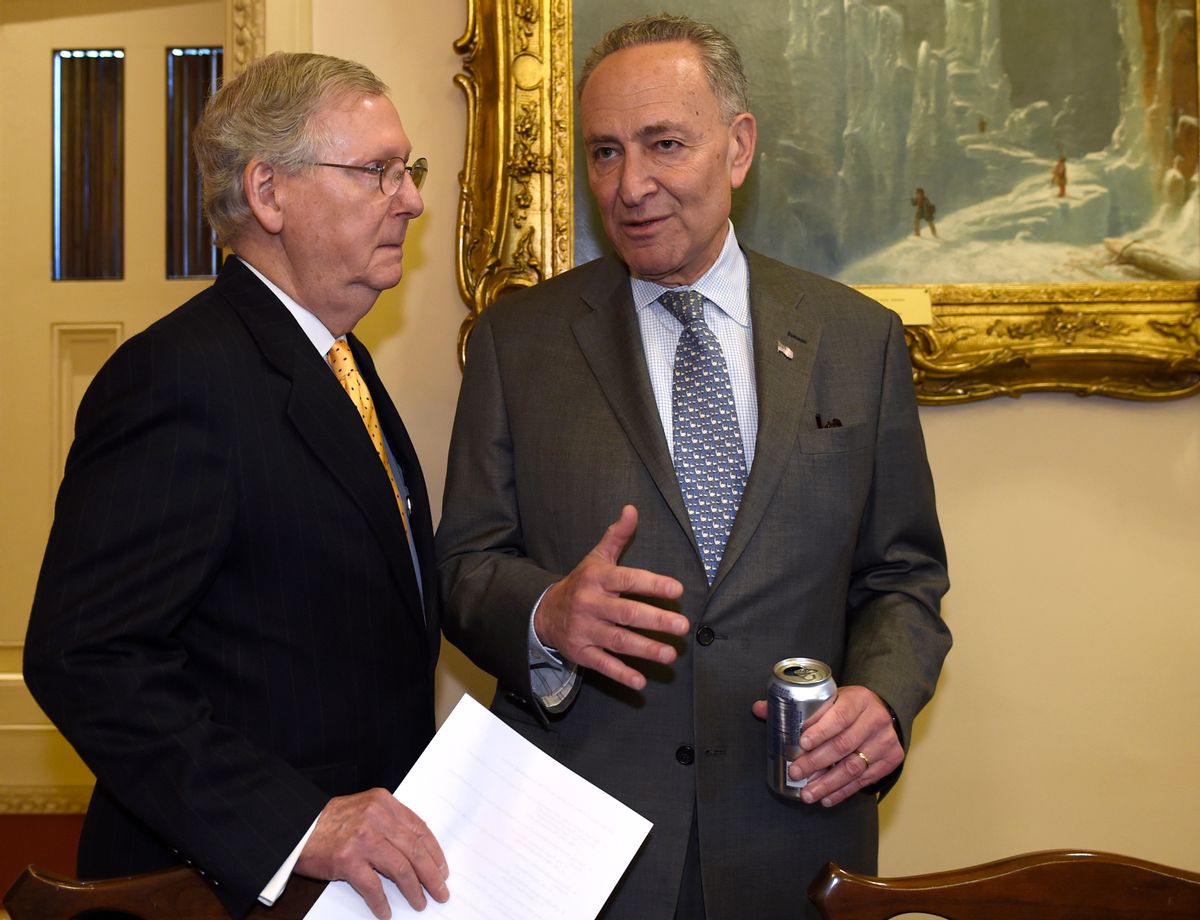 1. Trump’s words are irrelevant.
1. Trump’s words are irrelevant.
In the normal scheme of the American government, the president has the final say. When everybody else wants to avoid making a decision, the chief executive has to execute. As the sign on Harry Truman’s Oval Office said, “The buck stops here.”
In the Trump White House, the buck stops wherever. As the shutdown talks went on, the president’s position on immigration legislation was a mystery to Senate Majority Leader Mitch McConnell.
"As soon as we figure out what he is for, then I would be convinced that we were not just spinning our wheels going to this issue on the floor, but actually dealing with a bill that has a chance to become law and therefore solve the problem,” McConnell said.
Senate Minority Leader Chuck Schumer said working with Trump was "like negotiating with Jell-O."
The deal that led to the shutdown was negotiated by McConnell and Schumer without input from the White House. McConnell played the role of negotiator in chief, and he stuck with Trump’s nativist base. Trump’s sporadic rhetorical desire to make a deal to protect immigrant youth was irrelevant to the outcome.
Schumer’s Jell-O quip was correct, but raised the question, how come the gelatinous blob is claiming victory?
2. Democrats are dreamers, not Dreamers.
The whole point of the shutdown, at least for the Democrats, was to force President Trump to honor his promise last September to protect the Dreamers, the 800,000 young American immigrants who face deportation to countries they barely know.
In the end, the Democrats voted to end the shutdown in return for funding the Children’s Health Insurance Program (CHIP), which the Republicans had been holding hostage, and yet another promise from McConnell that he would bring legislation to protect the Dreamers.
Dream on, said MoveOn.org. “This is a bad, outrageous deal,” the progressive pressure group said. “Trump and Republicans in Congress stood with their anti-immigrant nativist base, and too many Democrats backed down, abandoned Dreamers, and failed to fight for their values.”
In other words, the Democrats voted as if the Republicans were acting in good faith, as if their concessions would be matched down the road with other concessions, as if a promise from Mitch McConnell was somehow more substantial than the breath he expended in making it. The Democrats who defected chose that illusion over protecting the Dreamers.
Most people are not so naive. “Democrats got rolled,” says Politico and the Washington Post.
3. A government shutdown benefits the anti-government party.
The real-life effects of a government shutdown are imperceptible.
The museums of Washington were only closed for the last few hours of the shutdown. There were long lines at the congressional office buildings on Monday because some entrances were closed. Lobbyists experienced slight delays for a few hours in their quest to shape public policy for private benefits, according to Politico.
"A lot of the folks we would normally be interacting with at the agencies are either off or doing triple duty," said Elizabeth Gore, a lobbyist, shortly before the McConnell-Schumer deal was struck.
Outside of Washington, the effects were even less visible. Since there is no substantial harm to any significant group of people during a shutdown, forcing a shutdown to extract concessions is unlikely to succeed. There is no leverage, only the appearance of leverage.
In October 2013, Republicans, led by Sen. Ted Cruz, closed the government for 17 days in an attempt to hold up funding for Obamacare. We were inconvenienced in Washington, but life was pretty normal elsewhere. Cruz eventually folded and Obamacare was unaffected. But governance by temper tantrum did not hurt the Republicans in the 2014 midterms. Quite the contrary. They won big. Not surprisingly, a government shutdown benefits the anti-government party.
Schumer and the Democrats did better than Cruz. They gained a victory on CHIP, which was significant but only as a consolation prize.
4. Politically, it's a wash.
Liberal Democrats are furious that Schumer and Senate Democrats folded, but it's hard to see what progressives would have gained by continuing the shutdown. Extending the shutdown would not have strengthened the Democrats' position. While the real-world impact of a shutdown is minimal, the psychic costs are felt mostly by Democrats.
As followers of the anti-government party, Republican voters experience a shutdown as proof that government isn’t working, a narrative that dovetails nicely with GOP dogma that it can’t work.
As followers of the socially active party, Democrats experience a shutdown as a failure of purpose and a threat to the good work government does. Blaming Republicans for a shutdown is like complaining that they are hypocrites, a charge that is true and which probably applies to all politicians. So the Democrats' defense of a shutdown winds up damaging themselves as much or more than their opponents. The less time they spend making such a case, the better off they are.
The three-day shutdown will be forgotten by November, if not by next week. Its effect on the party’s prospects in 2018 is likely to be negligible, especially compared to the impact of the still-unresolved fate of the Dreamers. The shutdown is mostly a reminder that it's a mistake to treat Trump as a presidential decision maker. He's the spokesman for the nativist majority in his party, not a deal maker.



Shares